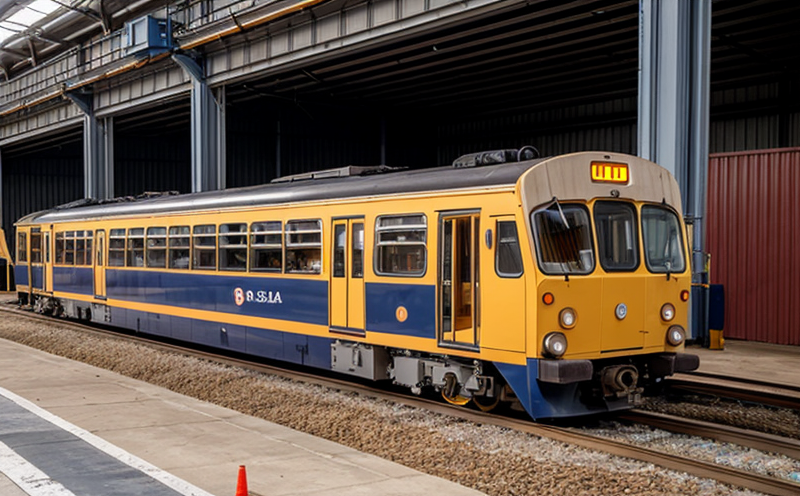ISO 6507 Vickers Hardness Testing of Weld Zones in Rolling Stock
The ISO 6507 standard specifies the method for performing Vickers hardness testing. In railway and transportation, particularly focusing on rolling stock structural integrity, this test is crucial for ensuring that weld zones meet the necessary mechanical properties.
Rolling stock structures are subjected to significant stress and strain during operation, requiring robust materials capable of withstanding these conditions without failure. Welds in these structures play a pivotal role as they ensure the structural integrity by connecting different parts of the vehicle. The quality of these welds is critical for preventing potential failures that could lead to accidents or breakdowns.
ISO 6507 Vickers hardness testing provides a reliable method to assess the hardness of materials in weld zones, which directly influences their strength and durability under operational conditions. This test involves pressing a diamond indenter into the surface of the material at a specified load for a defined time interval before measuring the indentation depth.
The results obtained from this test are essential for quality assurance purposes, ensuring that all parts of rolling stock meet the required standards set by regulatory bodies and manufacturers' specifications. By adhering to ISO 6507 guidelines, railway operators can enhance safety and reliability in their fleets, thereby reducing maintenance costs and improving overall operational efficiency.
For accurate testing, specimens must be prepared according to specific requirements outlined within the standard. Specimens should represent typical conditions found on-site, including any heat treatment or post-weld treatments that may affect hardness values. Proper sample preparation ensures consistent results across multiple tests conducted over time.
The use of advanced Vickers microhardness testers allows for precise measurement down to very small scales, making it suitable even for localized areas within larger components like weld zones. These instruments provide high-resolution images and data points that can be analyzed statistically to ensure compliance with specified limits.
Once tested, the findings from ISO 6507 Vickers hardness testing serve several purposes:
- Evaluation of material quality in manufactured parts
- Detection of any deviations from expected properties due to manufacturing processes or environmental factors
- Verification of compliance with relevant international standards such as ISO 6507 itself, ASTM E384, EN 1928.
By incorporating ISO 6507 Vickers hardness testing into their quality control procedures, organizations in the railway and transportation sectors demonstrate commitment to maintaining high safety standards while optimizing resource allocation through informed decision-making based on empirical evidence rather than assumptions or guesswork.
| Industry Applications | Description |
|---|---|
| Railway & Transportation | Evaluating the hardness of weld zones in rolling stock structures to ensure structural integrity and compliance with safety regulations. |
| Aerospace | Assessing material quality in aircraft components requiring high-strength properties. |
| Automotive Manufacturing | Checking the hardness of critical joints used during car assembly processes. |
| Machinery Fabrication | Sustaining accurate measurements for wear-resistant surfaces and other critical areas susceptible to stress. |
Eurolab Advantages
EuroLab brings several advantages when performing ISO 6507 Vickers hardness testing on weld zones in rolling stock:
- Expertise and Experience: Our team consists of highly skilled professionals with extensive experience in various sectors, including railway transportation.
- State-of-the-Art Equipment: We utilize cutting-edge technology that guarantees accurate readings every time. Our instruments are regularly calibrated to maintain precision.
- Comprehensive Reporting: Besides providing detailed reports, we offer insights into areas needing improvement along with recommendations for corrective actions where necessary.
- Customer Support: From initial consultation right through to final analysis and report submission, our dedicated customer support team is available round the clock to assist you throughout your project lifecycle.
- Regulatory Compliance: Ensuring all tests follow recognized international standards like ISO 6507, ASTM E384, EN 1928 ensures that results are universally accepted and can be used across borders if required.
EuroLab's commitment to excellence makes us the preferred choice for comprehensive quality assurance solutions in numerous industries. Partner with us today to experience unparalleled service and expert guidance tailored specifically towards your unique needs.
Why Choose This Test?
- Non-Destructive: Unlike some other testing methods, ISO 6507 Vickers hardness testing does not damage the sample, allowing for repeated measurements if needed.
- High Precision: The method provides precise and repeatable results even when dealing with very small areas or thin sections of material.
- Fully Automated: Modern testers automate much of the process, reducing human error while increasing throughput rates significantly.
- International Recognition: Results from this test are widely accepted globally due to its rigorous standards and reproducibility across different laboratories.
- Cost Effective: While initial setup costs might be high for acquiring appropriate equipment, long-term savings accrue because of reduced rework rates and extended component lifetimes.
- Enhanced Safety: By identifying weak points early on through this type of testing, potential hazards can be addressed proactively before they escalate into major issues.
The combination of these factors makes ISO 6507 Vickers hardness testing an indispensable tool for maintaining robust quality standards in railway and transportation applications.





